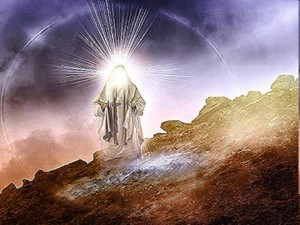Today’s reading from Morning Prayer tells how Moses went up to the holy mountain and there saw God.
29 When Moses came down from Mount Sinai, with the two tables of the testimony in his hand as he came down from the mountain, Moses did not know that the skin of his face shone because he had been talking with God. 30 And when Aaron and all the people of Israel saw Moses, behold, the skin of his face shone, and they were afraid to come near him. 31 But Moses called to them; and Aaron and all the leaders of the congregation returned to him, and Moses talked with them. 32 And afterward all the people of Israel came near, and he gave them in commandment all that the Lord had spoken with him in Mount Sinai.33 And when Moses had finished speaking with them, he put a veil on his face; 34 but whenever Moses went in before the Lord to speak with him, he took the veil off, until he came out; and when he came out, and told the people of Israel what he was commanded, 35 the people of Israel saw the face of Moses, that the skin of Moses’ face shone; and Moses would put the veil upon his face again, until he went in to speak with him.
Newman refers to this passage in a curious poem which he wrote on January 9, 1833 while at sea.
BANISH’D the House of sacred rest,
Amid a thoughtless throng,
At length I heard its creed confess’d,
And knelt the saints among.Artless his strain and unadorn’d,
Who spoke Christ’s message there;
But what at home I might have scorn’d,
Now charm’d my famish’d ear.Lord, grant me this abiding grace,
Thy Word and sons to know;
To pierce the veil on Moses’ face,
Although his speech be slow.
The grammar of the poem and its allusions are not easy. What does the word “banished” modify? Or is it an imitation of the Latin ablative absolute? What is “the House of sacred rest”?
Newman entered the Roman Catholic Church in 1845, but he was already feeling the pull in 1833. My stab at an interpretation is that “the House of sacred rest” is the Roman Catholic Church; it has been “banished” from England. Somewhere in the Mediterranean Newman, the “I” of the poem, amid a thoughtless throng heard its (the Roman Catholic Church’s) creed confessed and knelt among its saints.
The Catholic preacher was not very good (nothing new there) and, unlike the learned Anglican divines, was artless and unadorned. But Newman, who would have looked down on such preaching at home (in the Anglican Church? In Oxford?) had not heard the word of God preached in while and was famished for it.
Newman prays for the grace to recognize God’s Word and children in all circumstances. He asks to see the glory hidden behind an unprepossessing human façade, as Moses’ face was hidden behind the veil. The preacher that Newman heard was not a good speaker – but then neither was Moses, who told God that he couldn’t speak to Pharaoh, so God appointed Aaron as his spokesman.
